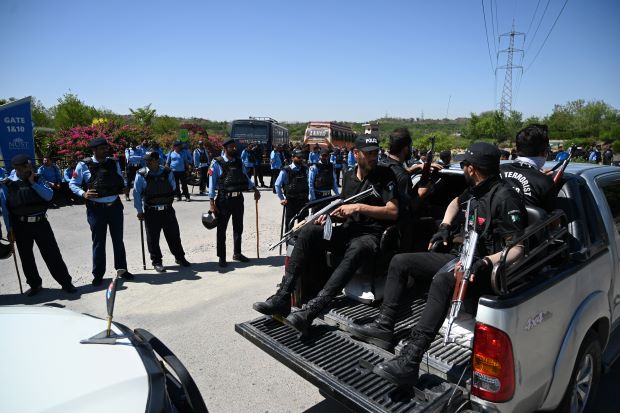Former Pakistan PM Khan in court after arrest prompts riots
By Sajjad Tarakzai
ISLAMABAD – Former Pakistan prime minister Imran Khan appeared in court Wednesday (10) on graft charges as violent nationwide protests over his arrest erupted for a second day.
Lawyers for Khan said the National Accountability Bureau (NAB) – the anti-graft body which ordered Khan’s arrest – had asked the judge to remand him in custody for at least 10 days.
Khan was arrested during a routine hearing in the capital Islamabad Tuesday (9) and whisked away to an unknown location overnight before appearing behind closed doors in a specially convened court at police headquarters.
The drama follows months of political crisis during which Khan, who was ousted in April last year, has waged an unprecedented campaign against the country’s powerful military.
“The judge of the accountability court has reserved the verdict but has not pronounced it yet,” Sher Afzal Marwat, a lawyer for Khan’s Pakistan Tehreek-e-Insaf (PTI) party, told media.
He added that Khan was in “good spirits”, but complained he had been hit on the back of the head and leg by the paramilitary forces that arrested him.
The former cricketing superstar, who remains wildly popular, has previously denied all the charges in dozens of cases brought against him.
He says the myriad legal cases are part of an effort by the struggling government and military establishment to prevent him from returning to power.
His arrest has brought tens of thousands of his supporters to the street in cities across the country.
“If they think that the arrest of Imran Khan will demoralize us, then they are hugely mistaken,” said Niaz Ali in Peshawar, where several monuments and government buildings have been torched.
“We stand with Imran Khan and will support him till death.”
Khan’s arrest came hours after the powerful military rebuked him for alleging that a senior officer had been involved in a plot to kill him.
Pakistan politicians have frequently been arrested and jailed since the country’s founding in 1947, but few have so directly challenged a military that has staged at least three coups and had ruled for more than three decades.
The country’s communications agency said the interior ministry had ordered mobile internet services cut and restricted access to social media sites Twitter, Facebook and YouTube.
Authorities have ordered schools closed across the country –- with end of year exams cancelled for students.
Hundreds of police officers have been injured across the country, while in Pakistan’s most populous province of Punjab nearly 1,000 people have been arrested and the army ordered to deploy to keep peace.
Some protesters took out their wrath on the military, torching the residence of the corps commander in Lahore and laying siege at the entrance to the army’s general headquarters in the garrison city of Rawalpindi.
“At a time we are already struggling to feed our children, further uncertainty has been created,” Farooq Bhatti, a van driver, told AFP in Rawalpindi Wednesday morning.
“The violence will not serve anyone… everyone will be affected… but I doubt the decision makers care.”
Protesters blocked some routes leading to Islamabad around lunchtime Wednesday but there was a huge security presence across the capital, particularly outside the so-called police lines where the special court convened.
Law Minister Azam Nazeer Tarar told a press conference there was “no political vendetta” surrounding Khan’s arrest.
The case that led to his detention was brought by the NAB, which said he had ignored repeated summons to appear in court.
“Whenever he was summoned to court, he would do so at his own leisure — and only after being given a final warning,” said Tarar.
Khan has faced dozens of charges since being ousted in April, a tactic analysts say successive Pakistan governments have used to silence their opponents.
Pakistan is deeply mired in an economic and political crisis, with Khan pressuring the struggling coalition government for early elections.
He has been increasingly outspoken against the establishment, relying on near-fanatical support from the huge crowds that accompany his public appearances to protect him from arrest.
At a weekend rally in Lahore, Khan repeated claims that senior intelligence officer Major-General Faisal Naseer was involved in an assassination attempt last year during which he was shot in the leg.
The military’s Inter-Services Public Relations wing in a statement rejected “this fabricated and malicious allegation”.
The government says the assassination attempt was the work of a lone gunman, who is in custody and who confessed in a video controversially leaked to media.
Criticism of the military establishment is rare in Pakistan, where army chiefs hold significant influence over domestic politics and foreign policy, and have long been accused of interfering in the rise and fall of governments.
“The senior army leadership is uninterested in repairing the rift between itself and Khan,” said Michael Kugelman, director of the South Asia Institute at the Wilson Centre.
“So with this arrest it’s likely sending a message that the gloves are very much off.”
– Agence France-Presse



Comments are closed, but trackbacks and pingbacks are open.